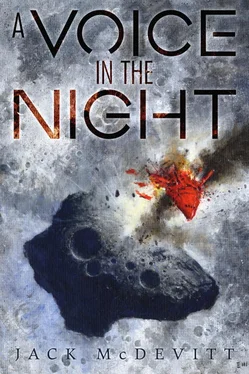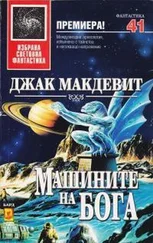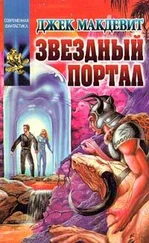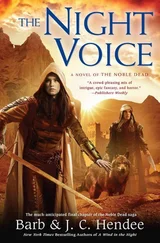He left the school behind, cruised past homes and the bake shop and the North Star Apartments. Two blocks up from Bannister, he passed Floyd’s house. It was a pale green immaculately-kept two-story frame, with an enclosed front porch. Two box elders grew in a spacious, freshly-raked front yard. (The leaves had been bagged, and lined a side wall.) Broad manicured hedges marked its boundaries. A carefully-arranged assortment of bushes implied the owner’s almost obsessive taste for symmetry and order. The evening newspaper, the Grand Forks Herald , lay folded in the middle of the lawn.
Floyd’s red Nissan was parked in the driveway. And the man himself appeared at the door, waved to Arnold, and strolled out to pick up his newspaper.
Arnold waved back.
“Look out for the thing in the woods,” he called, as Arnold passed.
Shouldn’t have said anything. Arnold increased his pace slightly, felt his cheeks grow warm.
He was now approaching the Fort Moxie Library.
The library was the town’s pride. The taxpayers had supported a bond issue, an architect from Bismarck had designed the structure to resemble a Greek temple, and contributions of both books and money kept the institution well-funded.
The Greek temple commanded the top of a rise surrounded by lawns which had just begun to turn brown. Two elms, a flagpole, a statue of a cavalry soldier (from the days when the town was really a fort), and a few woodland iris and honeysuckle bushes contributed to a sense of disconnectedness from the world outside. The library was a time warp, located in a town that did not even have a police officer. It was part Hellenic, part 1910. A pebbled walkway, lined with green benches, curved through the grounds. The benches were occupied by teenagers, or by older residents enjoying the late summer days. And one, the one directly in front of the temple, facing it, held a stranger, a young woman Arnold had never seen before. She was, as he was quick to note, as his breath left him and he ran off the side of the curb, a woman of surpassing beauty.
It would have been an exaggeration to say that Arnold never had luck with women. There had been a few in his life, perhaps a half-dozen who had bedded down with him, and even one or two who might have gone to the altar with him. But none of these, in the full blaze of daylight, were able to fire his boilers, so to speak. The women who might have been capable of doing that always frightened him, and so they inevitably ended on someone else’s arm while Arnold kept his fragile ego intact. He could say, to his shame, that no truly beautiful woman had ever rejected him.
The woman on the bench was truly beautiful.
She had liquid green eyes, and red-blond hair cut shoulder length. When she moved, the hair swirled and caught the light. Her features were finely-chiseled, aristocratic in the finest sense, illuminated by an inner energy that drove Arnold’s blood pressure well into the danger zone. Her expression suggested quite clearly that she would be unapproachable.
A book lay open on her lap, and a worn imitation-leather briefcase had fallen over at her feet. She was conservatively dressed in a light brown blouse and a dark bronze skirt.
Needless to say, it would never have occurred to Arnold to alter course, to venture a hello, or even a wave as he went by. Rather, he simply continued on, watching as best he could until he had crossed Patcher Street, and the beautiful young woman passed from sight behind Kaz Johansen’s yellow frame house.
Fifth Street just more or less stopped, went to dirt, and played out along a block where several houses were currently under construction, where only Al Conway actually lived. Arnold passed Al’s place, and continued to the end of the street.
There was an empty lot back there, beyond the construction, covered with thick grass and dead leaves. The lot mounted gradually into the wind screen. Arnold slowed, but did not stop. He felt proud of the fact that he was confronting his fears. He wondered whether the issue had ever been in doubt as he picked his way across uneven ground, moved up the short slope, and entered the trees.
The stated purpose of the tree belts is to protect towns from the winds that whip the prairie. During the previous spring, a poet who had come from St. Louis to speak at the library had said the real reason for windscreens had nothing to do with the wind; it was that it hurt people to look at all that emptiness, all the way to the horizon, so they grew walls around themselves. The poet, Arnold guessed, had never been in Fort Moxie during the winter.
The narrow belt of woodland was very quiet.
He slowed to a walk. The wind moved softly through the upper branches, through patterns of sunlight. His fears had eased: The wood felt unthreatening and peaceful. The incident of the day before seemed unreal and very far away. These trees were his. Nothing frightening could move among them.
He picked up his pace. The jogging path came in from the left, and he eased onto it. The air was cool and invigorating, but it harbored the first suggestions of the long winter to come.
He thought about calling out to the voice. Challenging it. Hey, Voice. I’m back. But he hadn’t recovered that much of his courage. The forest moved around him. Branches swung, insects whispered in bushes, and the sounds of his passing echoed back at him.
The river appeared, off to the northeast. He was drawing close to the spot where The Encounter had occurred.
Arnold slowed down, moving at a deliberate pace, saving his energy. The path was moving now to the far side of the trees, the outside of the screen, where it continued while the river angled in. The black boulder loomed ahead.
He stopped.
The wind drew at him, pulled at his clothes, rippled across the grass.
“Are you here?” he asked, very softly, not entirely sure he had mouthed the words at all.
The branches creaked and sighed.
The river flowed.
But there was nothing more. Feeling much better, Arnold broke into a brisk, triumphant trot.
The wind picked up. It smelled of water and green bushes. The foliage moved. The daylight changed complexion, as if something had come between him and the sun. Clouds drifted into the sky, toward the east. The sky was beginning to darken.
And the wind spoke.
“Do not—”
Arnold’s knees locked. He tumbled, sprawled flat. There was nothing behind him. Nothing anywhere he could see. The sound had a stereo quality: It came from all directions.
“—Be afraid.”
If there was anything more likely to terrify Arnold than a visitation in a lonely glade, it was an injunction, from whatever source, not to panic. He crouched on the ground, heart pounding. No one moved among the trees. The river was quiet, and the path was empty, as far as he could see. The voice was too close to have come from the opposite bank.
No human throat could have made that leafy, gurgling, wind-blown sound. “Who’s there?”
His heart fluttered, and his breath caught, but he was able to keep the previous day’s sickening panic at bay.
“Hello, Arnold.” The treetops rolled slowly back and forth, as if a giant unseen hand played with them. “I was hoping you would come back.”
A warm breeze touched his cheek.
“Where are you?”
“Here.” Something like laughter raced through the foliage. “I’m beside you.”
“Where? Show yourself.” Arnold struggled against rising panic.
“There is nothing to show.”
“Say again?”
“There is nothing to see. Unless the light is right.”
Got to be a trick. Somebody had to be recording this. Was he going to hear it played at the Elks next Saturday night? “Whoever you are, I don’t care for the game.” He was still not speaking loudly. “Is that you, Floyd?”
Читать дальше









